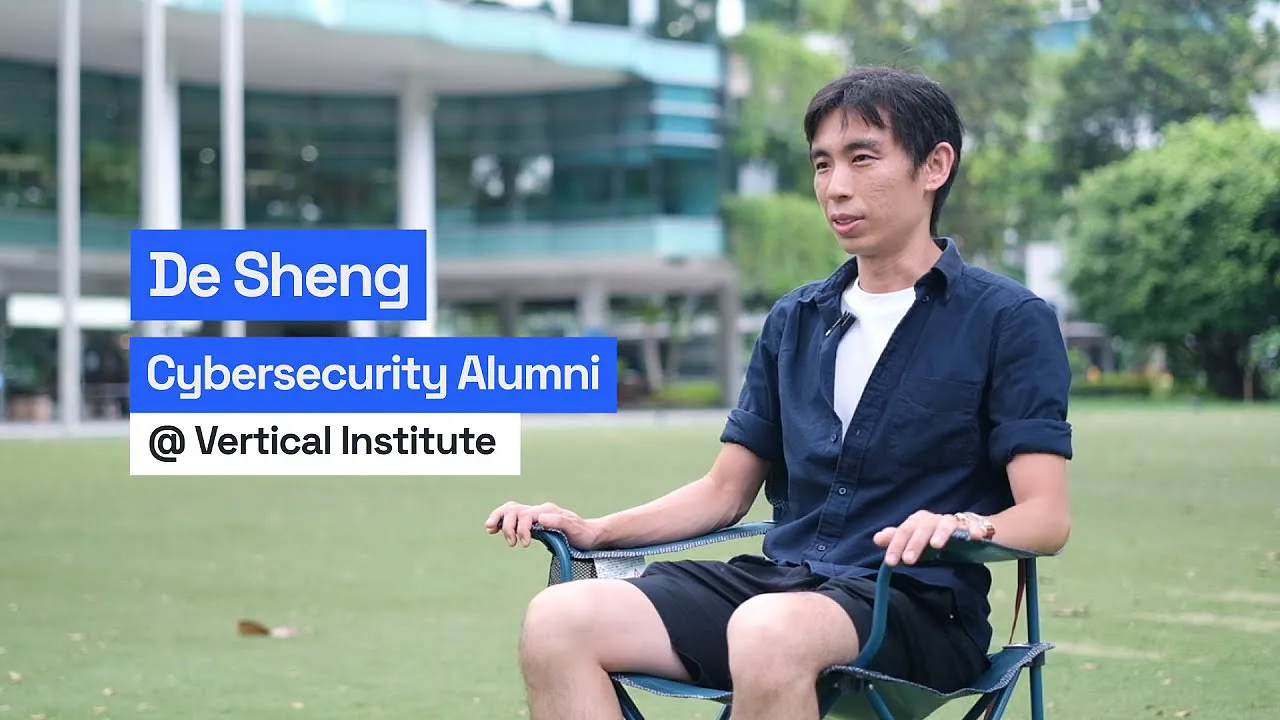Kickstart Your Cybersecurity Journey Today
Begin your journey with IBF-accredited cybersecurity course for beginners. Learn, adapt, and transform your career with training recognised by industry leaders in Singapore.
Book a call with our team

Other ways to reach us
Other ways to reach us
Our Cybersecurity course graduates come from industry-leading companies.
Jumpstart with IBF-accredited Beginner-Friendly Cybersecurity Course

Vertical Institute’s graduates from this Cybersecurity course include individuals from JP Morgan Chase, IBM, CPF, Shell, Dell and more.

Possible Career Pathways for Cybersecurity:
Cybersecurity Course Details
Class Details and Support
7 lessons, 3 hours each lesson
Online classes via Zoom
1 Instructor, 1-2 Teaching Assistants
Live Q&A sessions
Close mentorship and guidance from instructors
Weekly free consultation slots
Capstone project feedback from instructor
Out of class support from TAs and instructor
Benefits of taking VI’s Cybersecurity course
Beginner-Friendly
Upskill with our Cybersecurity course without no prior background or experience.
Professional Certificate
Upskill with our Cybersecurity course without no prior background or experience.
Expert-led Learning
Learn new concepts and tools through expert-led lectures, discussions, assignments and project work
Personalised Feedback
Receive individualised feedback and support from your instructional team with free 1-on-1 consultations
Capstone Project
Apply what you’ve learned to create a capstone project solving a real-world data problem
Community Benefits
Be part of the VI community where members can leverage connections with alumni, instructors and experts
Career Support
Dedicated career support and matching with hiring partners
Hands-on Training
Fully hands-on training with industry tools
Cybersecurity Course Curriculum
Pre-Work
As a VI student, you will be given access to online learning materials in our e-learning portal.
To get you ready for learning, this essential pre-work will familiarise you with the basics of the key concepts and tools we will be using throughout the course.
Although you will learn these topics remotely before you arrive in class, you won’t be far away from the resources of the VI community. Make use of our Telegram channel to leverage connections with students, alumni, instructors and experts. At the end of your pre-work, you’ll be ready for the fast pace on campus!
After the course, you can choose to participate in follow-up sessions with your instructor, either in a group and/or individually, included as part of the course fee.
Module 1: Introduction to Cyber Security
- Internet, sea of opportunities and threats
- Types of cyber criminals
- Cybersecurity goals of Confidentiality, Integrity, and Availability
- Types of cyber-attacks
- Security trends in Singapore and across the globe
- Example of Open-Source Intelligence attack
Activity:
- Check on account exposure
- Case study on cybersecurity goals on organisations
- Review on recent security incidents affecting organisations in Singapore and map to cybersecurity goals
- Introduce the capstone project to students
Module 2: Cyber-Attack Chain
- Cyber-security snapshot
- Cyber-Attack chain
- Reconnaissance
- Weaponisation
- Delivery
- Exploitation
- Installation
- Command and Control
- Actions on Objective
- Security technologies
- Anti-virus
- Security monitoring
- Intrusion detection and prevention systems
- Identity and access management
- Biometrics
- Security scanners
- Security controls
- Demonstration of hacking examples mapped to the Cyber-Attack Chain phases
- Threat Modeling against organisation
Activity:
- Map security controls against cyber-attack chain
- Threat modeling
- Let’s rob a bank hacker simulation
Module 3: Online Security
- Password security
- Brute-force attacks
- Commonly used passwords
- Previously exposed passwords
- Password strength
- Multi-Factor Authentication
- Account security
- Email accounts
- Social media accounts
- Bank accounts
- Open-Source Intelligence (OSINT)
- Phishing
- Scams type related to organisations
- Fake bank’s website
- SMS verification
Activity:
- Password strength checker
- Enable multi-factor authentication in accounts
- Adjust privacy settings for social media accounts
- Check for activities online of accounts
- Search for information of a company using Open-Source Intelligence
Module 4: Risk Management - Perimeter of Exposure
- Cybersecurity risks examples to organisations
- Security risks and recommendations relating to
- Wireless
- Mobile
- Laptop
- USB device
- Web cameras
- Risk management
- Importance of Cybersecurity Risk Assessment
- Risk identification
- Examples
- Risk analysis
- Risk evaluation
- Guidelines on Risk Management Practises – Internet Controls for organisations in Singapore
- Vendors’ risk management
- Service providers’ risk management
- Insider threats’ risk management
Activity:
- Check for shared folders in computer
- Check for mobile application permission settings
- Update computers and mobile devices
- Enable antivirus and firewall on computers
- Determine cyber risks and responses for an organisation
Module 5: Social Engineering
- Tactics and techniques of social engineering
- Key principles with examples on organisations
- Authority
- Intimidation
- Social proof
- Scarcity
- Urgency
- Familiarity
- Social engineering vectors
- Vishing
- Phishing
- Smishing
- Impersonation
- Distinguish between a real and a scam email
- Distinguish between a real and a phishing website
- The Dark Web
Activity:
- Review third-party access to accounts
- Set browser security
- Design security program to prevent social engineering attacks
Module 6: Cybersecurity Regulations
- Personal Data Protection Act (PDPA)
- Objectives of securing our personal data
- How PDPA works
- Applying PDPA to personal and work activities
- Protecting personal data online
- MAS TRM
- Establish Sound and Robust Technology Risk Governance and Oversight
- Maintain Cyber Resilience
Activity:
- Case study on commission decisions
Module 7: Incident Preparedness and Response
- Why prepare for incidents?
- Assumed breach mindset
- Incident preparedness and response in organisation
- Preparation
- Detection and analysis
- Containment and eradication
- Post-incident recovery
- Incident response checklist
- Cyber-Security career tracks
Activity:
- Incident response simulation
- Capstone project discussion
Course Fee & Government Subsidies
Upskill with ease, take course fees off your mind with government subsidies.
Pay even less or 0 cash with additional support 🎉
All Singaporeans aged 25 years old and above can use their SkillsFuture Credits to fully offset the remaining fees after funding.
In addition, NTUC members can utilize UTAP to offset 50% of remaining fees (capped up to $500 per year).
Cybersecurity Course Schedules
Choose from our flexible course schedules outside working hours. We have timeslots available on weekday evenings or on weekends.
How to Apply in 3 Simple Steps
Select Class Schedule
Choose convenient classes on evenings or weekends.
Calculate Your Subsidies
Fill out the form to calculate your government subsidies.
Pay $100 Deposit To Secure Your Spot
Instead of paying the full fee, place a small deposit to secure your slot.
Meet our Instructors

Liangyang
Senior Specialist Technical Account Manager – Security @ AWS
Bachelor’s of Computing in Information System
National University of Singapore

George
Head of Threat Hunting, PayPal
Master of Computing (Infocomm Security), NUS
Bachelor of Science (Information Systems), SMU


Peter
CO-Founder, CEO @ Synectify
Dr of Philosophy, National University of Singapore


Anthony
IBF TFIP Cybersecurity Instructor
Bachelor’s in Information Technology
University of Wollongong

Cybersecurity Course Reviews
Job Placement Assistance
Vertical Institute offers Job Placement Assistance to graduates that have successfully completed any of our courses.
Over 1000 hiring partners
Land internship & industry opportunities
Apply your new skills learnt
We’ve Got the Answers For You
What is Cybersecurity?
“Recruitment firm Michael Page is seeing growing demand for cyber-security positions such as security operations manager and IT risk manager. Salaries for these roles can range from $10,000 to $12,000 a month, said Michael Page Singapore recruiter Isha Hussain.”
– The Straits Times, 1 May 2022
As our daily lives become increasingly dependent on internet-based tools and services, such platforms begin to amass more of our sensitive data.
Coupled with the ever-evolving cyberattacks and increasing creativity from hackers today, it continues to leave our computer systems and IoT in a vulnerable state. However, by utilising cybersecurity, it can help to prevent cyberattacks, data breaches, identity theft, and aid in risk management.
Are there course fee subsidies available?
The IBF Standards Training Scheme (“IBF-STS”) provides funding for training and assessment programmes accredited under the Skills Framework for Financial Services.
For our training programmes that are IBF-accredited, eligible Singaporeans & PRs may receive funding support under the IBF Standards Training Scheme (IBF-STS), subjected to all eligibility criteria being met.
For more information on the funding support, please visit: https://www.ibf.org.sg/programmes/Pages/IBF-STS.aspx
Can I use SkillsFuture Credits to pay for the remaining course fee after funding?
After you have registered for a course, a VI representative will reach out to guide you with the SkillsFuture Credits claim application.
Can NTUC Union members use UTAP to offset the remaining course fee after funding?
This claim must be done after completion of the course. Please refer to the UTAP FAQ for more information.
Can I use SkillsFuture Credits and UTAP at the same time?
For illustration purposes only:
Who is eligible for IBF funding support?
All Singaporeans or Singapore Permanent Residents (PRs) that are physically based in Singapore and successfully complete the course will be eligible.
- Be a Singaporean Citizen or PR physically based in Singapore
- Minimum of 75% attendance (this means that you must attend at least 6 out of 7 lessons)
- Pass the assessment
For Company-Sponsored:
- Be from Financial Institutions that are regulated by the Monetary Authority of Singapore (MAS) (either licensed / exempted from licensing) or Fintech companies that are registered with the Singapore Fintech Association.
- Be a Singaporean Citizen or PR physically based in Singapore
- Minimum of 75% attendance (this means that you must attend at least 6 out of 7 lessons)
- Pass the assessment
How do I obtain IBF funding support? Do I need to pay the full fee first?
For Self-Sponsored:
You must be a Singaporean or Singapore Permanent Resident (PR) that is physically based in Singapore. You will only need to pay the course fees minus the funding support. For example, if you are eligible for 70% funding support, you will only be paying S$610.50 nett, which can be paid with your SkillsFuture Credits.
For Company-Sponsored:
You must be a Singaporean or Singapore Permanent Resident (PR) that is physically based in Singapore and working in an eligible company:
- Financial Institutions that are regulated by the Monetary Authority of Singapore (MAS) (either licensed / exempted from licensing)
- Fintech companies that are registered with the Singapore Fintech Association
Your company will pay the course fees minus the funding support. For example, if you are eligible for 70% funding support, the company will be paying S$610.50 nett for company-sponsored participants.
Eligible companies will further be able to claim the remaining course fees after funding with the Training Allowance Grant (TAG) (S$10/hour of eligible training and assessment hours).
Is there a Cybersecurity Certificate granted at the end of the course?
Our programmes are well-regarded by top companies, who contribute to our curriculum and use our courses to train their own teams.
Are there any pre-requisites for this course?
What if I cannot attend a class?
Your attendance is only counted if you attend a makeup class.
What are the other in-demand courses at Vertical Institute?
Which is the best Cybersecurity course for beginners?
Even those without any prior background or experience can upskill seamlessly, thanks to its beginner-friendly approach. Moreover, participants benefit from hands-on activities under expert guidance and, upon completion, receive an accredited Cybersecurity Certification recognised in Singapore.
Can a beginner learn cybersecurity?
Can I study cybersecurity without background?
Can I learn cybersecurity even if I don't have experience?
Moreover, the institute provides flexible scheduling options, with time slots available on weekday evenings or weekends, catering to working professionals. Upon completion, participants earn an accredited Cybersecurity Certification recognized in Singapore. To embark on this transformative journey, simply take the Vertical Institute’s cybersecurity course.
Got another Question?
Contact UsAre you ready to skyrocket your career and income potential? 🚀

Without the right qualifications, standing out in Singapore’s competitive job market becomes a challenge. With Vertical Institute, you can get certified in high-demand tech skills in just 21 hours! 🕒
Get in touch to find out more today! 🎉

Featured on
As Featured on Channel NewsAsia with the Prime Minister Lawrence Wong
Vertical Institute Instructor Clarence chats with Prime Minister Lawrence Wong on upskilling.






Our instructors and students come from top companies
At Vertical Institute, we unite a diverse community of learners and instructors from global industry leaders. Our courses offer a unique chance to learn from experts, network with professionals, and gain insights from top-tier organizations.














